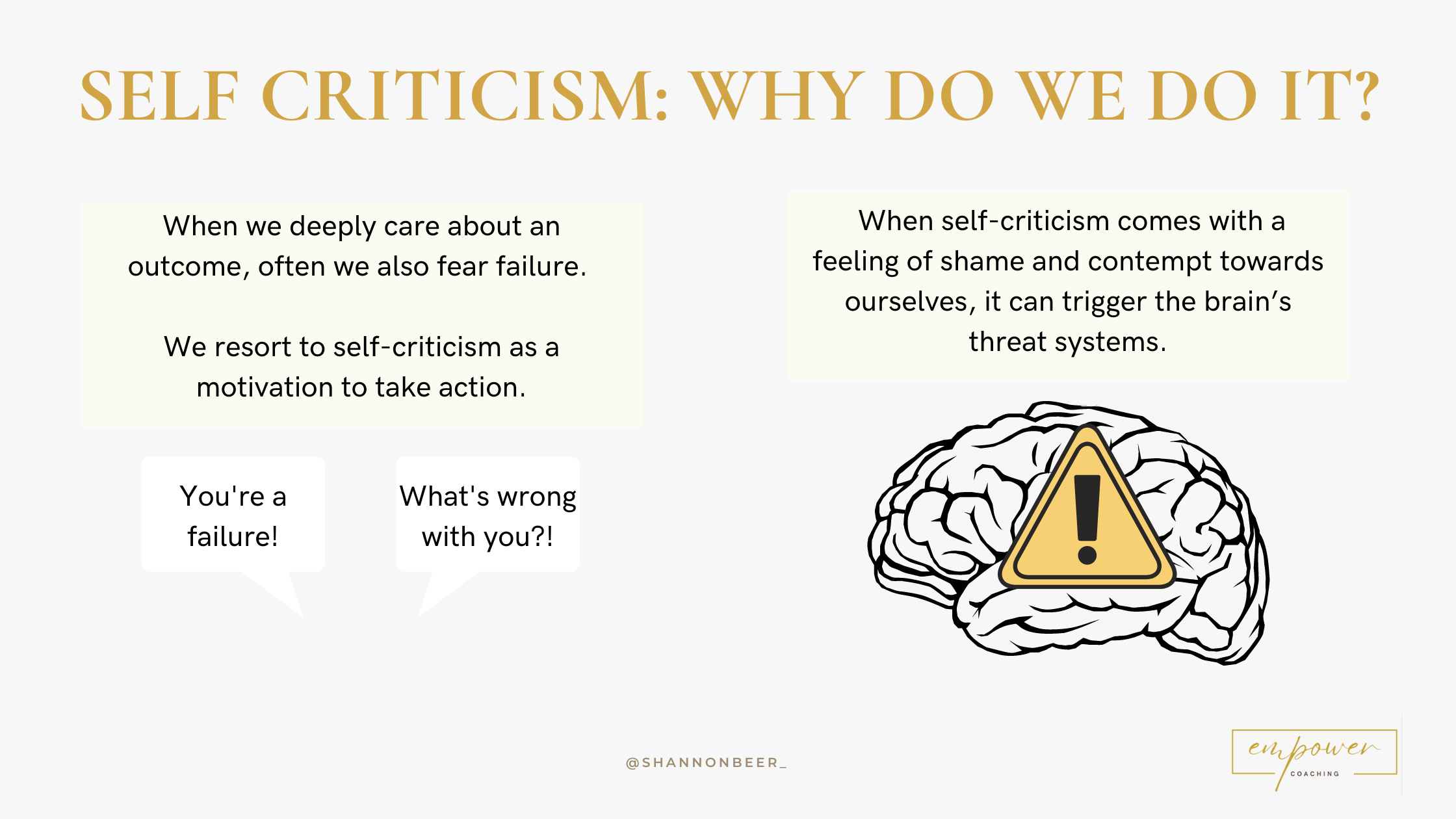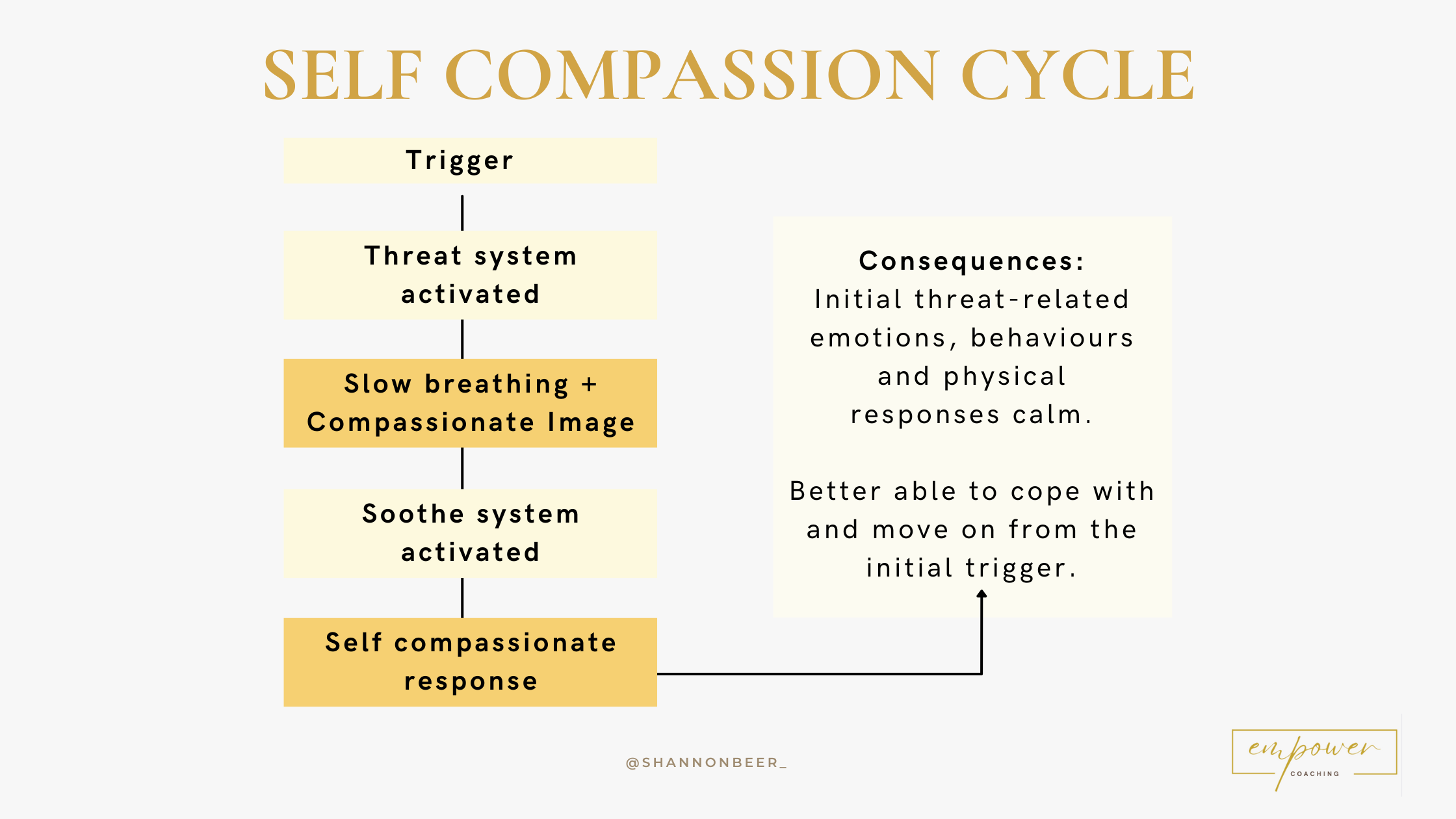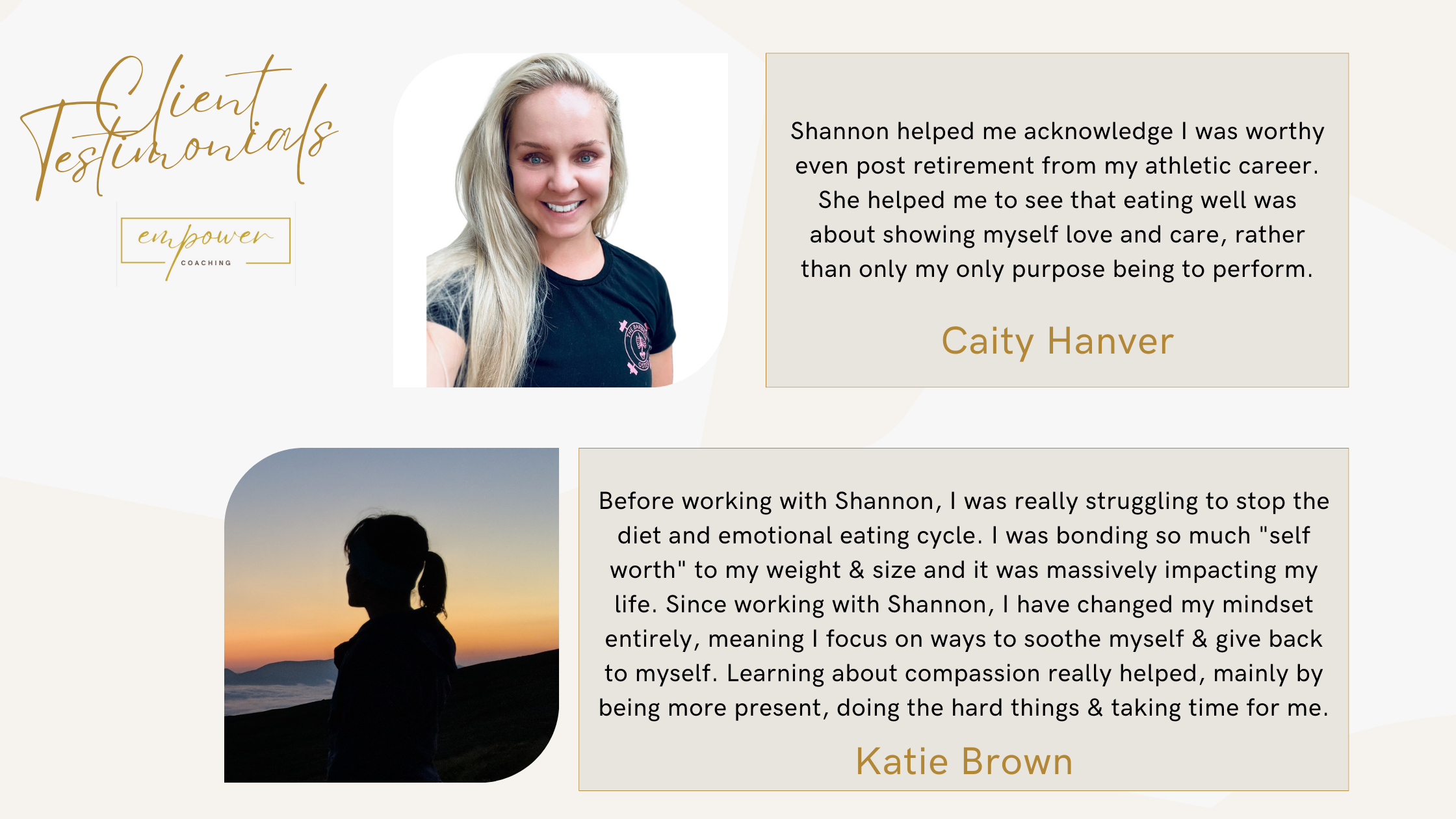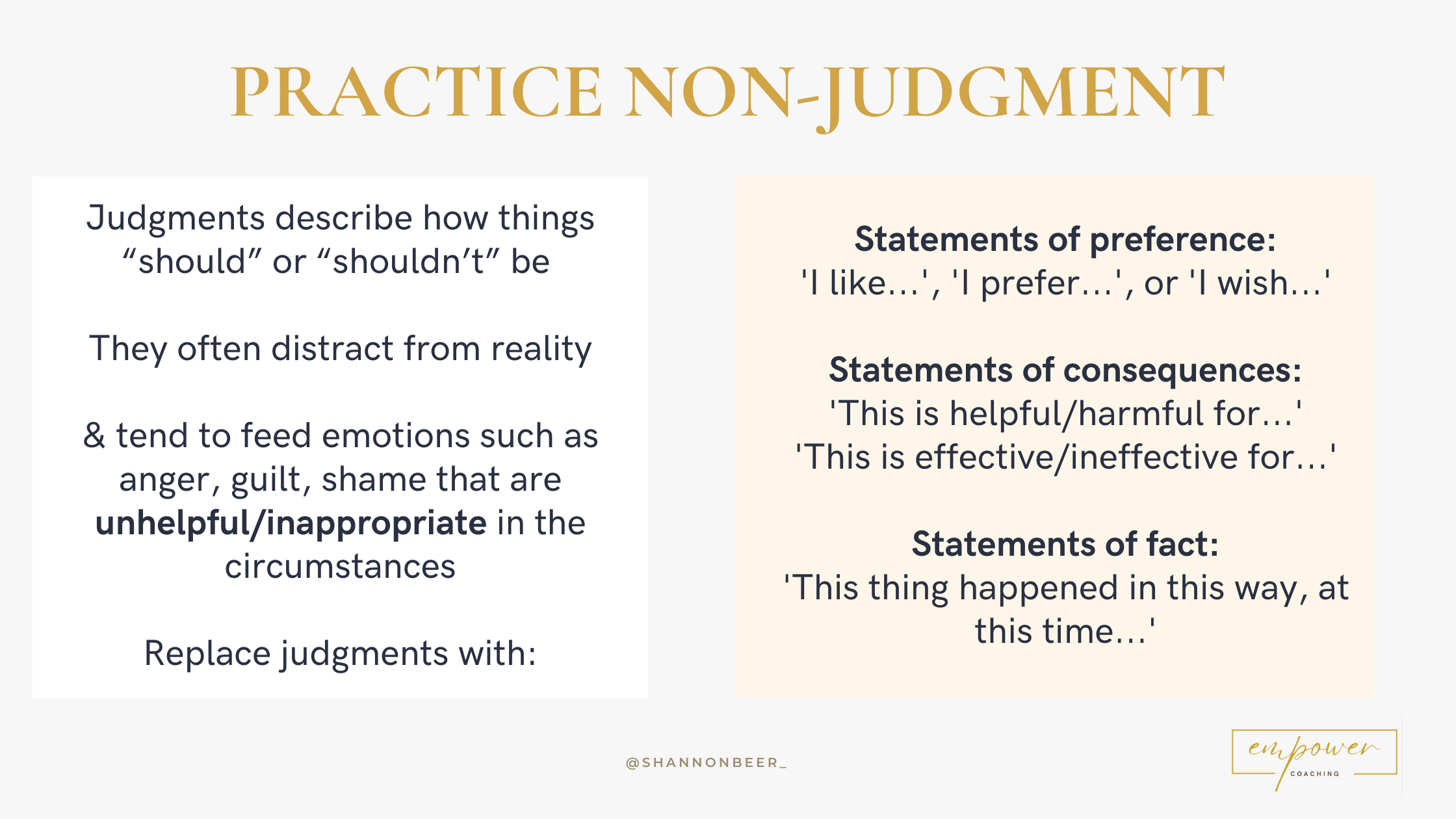
A Beginner's Guide to Self-Compassion
May 25, 2023Breaking the Cycle of Self-Criticism: A Beginner's Guide to Self-Compassion
We've all been there. That voice in our heads that tells us we're not good enough, smart enough, or attractive enough. It's the voice of self-criticism, and it can be a tough cycle to break. Particularly when we slip up on our diet and exercise behaviours. But what if there was a way to quieten that voice and counteract it with a more compassionate and supportive one?
That's where self-compassion comes in. It's the practice of treating yourself with the care and having the courage to face your difficulties. Although it's not easy, it's a skill that can be learned.
In this beginner's guide to self-compassion, I'll explore why self-criticism is so harmful, the benefits of self-compassion in health and fitness, and practical tips for incorporating self-compassion into your daily life. So if you're ready to break the cycle of self-criticism and start treating yourself with the respect and support you deserve, let's get started!
The Difference Between Self-Criticism and Self-Compassion
We all engage in self talk. We can speak to ourselves in a way that is kind and supportive, while at other times, we can be incredibly harsh and critical. Self-criticism is the voice that tells us we're not good enough, smart enough, or talented enough. It's the voice that points out our flaws and shortcomings, often in a way that is unproductive and unkind. Self-criticism is a central feature in many mental health problems [1].
So why do we do it?
We engage in self-criticism to prompt us to 'do things right' so we will be accepted by others and can protect our self-concept. From an evolutionary perspective, it is a threat to our survival to be left outside the group. As a result, the body reacts to self-criticism as an internal threat, which means it activates our body’s stress system. Our brain releases cortisol (a stress hormone) and this activates the sympathetic nervous system (‘fight-flight response’) and prepares an us to act. Put simply, we engage in self-criticism to keep ourselves safe. The problem is it just isn't that helpful and can be used inappropriately, when we're not in any real danger. Self-critical individuals are usually focused on achieving goals once they are pervaded by feelings of inferiority, worthlessness, failure and guilt [2] - like trying to change your body because you don't feel attractive enough.

Self-criticism has been defined as occurring on a continuum. It varies from a more externalised self-evaluative domain that involves social comparisons and perceptions of hostility from others, to a more internalised domain that entails a sense of inferiority and of falling short of one’s (often unrealistic) goals [3].
It's not just about what we say to ourselves - it is the emotions associated with the self-criticism as much of the content, that drives the mental health difficulties [4]. Shame goes hand in hand with self-criticism, along with experiencing a lack of internal safety [5].
Self-compassion, on the other hand, is a commitment to our own wellbeing and the prevention of suffering [6]. Self-compassion is the voice that offers comfort and support when we are struggling. Self-compassion is not about ignoring our flaws or pretending that everything is perfect. Instead, it's about acknowledging our imperfect nature and treating ourselves with the same care and concern that we would offer to a good friend.
The physiological processes underpinning self-reassuring and caring, compared to self- criticism and shame, are associated with different brain systems [7]. Positive ways of relating to ourselves, as opposed to self criticism, have very different impacts on well-being and mental health, physiology and neuro-physiology [8]. High levels of compassion have been associated with improved emotion regulation and mental health. A wealth of research has reported consistent associations between self-compassion and lower levels of body image concerns, disordered eating pathology, and negative affect [9].

So, what's the difference between self-criticism and self-compassion? Self-criticism is rooted in fear and judgment, while self-compassion is rooted in kindness and understanding. Whereas relying on self-criticism to motivate ourselves can make us stressed, anxious, depressed (and take us further away from our goals), compassion enables us to feel safe, emotionally balanced and motivated to develop and progress. With self-criticism, we're often our own worst enemies, while with self-compassion, we become our own best allies.
The Effect of Self Criticism on Eating Behaviours
In the context of eating and weight regulation, denigratory forms of self-criticism may undermine self-regulation, as uncontrolled eating may be used as means to cope with negative emotions resulting from self-criticism [10]. Paradoxically, our attempts to 'get our shit together' by criticising ourselves, often just make it harder to eat well.
Self-criticism also plays a significant facilitating role in disordered eating psychopathology and hence poor mental wellbeing [11]. Not only does self-criticism influences core cognitions, such as body dissatisfaction [12], but it is often used as a form of punishment after breaking food rules [13]. Unsurprisingly, highly self-critical patients showed more severe disordered eating pathology compared to less self-critical individuals [14].
Helping individuals develop self-reassurance and self-compassionate capabilities may help buffer against the pervasive effects of shame and self-criticism in a number of physical and mental health [15] conditions, including eating and body image-problems [16].
If you have struggled to regulate your eating behaviours, it could be that you would benefit from more targeted approaches that:
1. Address problems related to feelings of shame and negative self-criticism around difficulties to control eating behaviour and manage weight
2. Promote self-reassuring abilities
In fact, developing compassion has changed the game for many of my clients.

If you would like to learn more about what this could look like for you, submit an enquiry for coaching HERE.
Compassionate Self Improvement
A common obstacle to developing self-compassion is the belief that criticism is necessary to hold ourselves to the standards we want to uphold. Yet as we discussed, this approach actually backfires. It is only when we drop the shame and self-attacking that we can learn from our mistakes. A more helpful approach to self improvement is about improvement and looking forward, rather than punishing ourselves. Remember this: beating yourself up for something you’ve done doesn’t change the fact that it happened.
To move towards compassionate self improvement, the first step is to notice when you are judging yourself and swap your judgments for statements of preference, consequences, or fact. If you can also name how you’re feeling, this will help you to regulate your emotions and behave more effectively.

‘I’m such a lazy piece of shit’ becomes ‘I didn’t get everything done that I wanted to do today and I skipped my workout’ (FACT) ‘and I feel frustrated with myself’ (FEELING).
You might decide that a rest day isn’t the end of the world. Or maybe you’ll decide that actually, you’d feel better for working out, and resolve to act differently next time. Either way, you’ll probably find it easier to make effective choices for you.
Self-Compassion Practices
Cultivating self-compassion is a process, and it takes time and practice. A lot of the advice online is very wishy washy, and it can be disheartening to feel like it's not working. Being kind to yourself is just not that easy. Rather than give you some vague advice, I want to offer you some practical exercises.
One of the most helpful places to start is with soothing rhythm breathing. When we are in threat mode, our sympathetic nervous system is active. We need to stimulate the opposing force of the parasympathetic nervous system to calm our body and mind. Soothing breathing works because it stimulates our vagus nerve and this increases our Heart-Rate Variability (HRV), a marker of our body’s ability to respond effectively to stress. This activates your brain’s soothing system and is an essential skill if you want to improve your ability to handle stress and difficult emotions. You can follow a guided practice HERE.
Here is a playlist of some more self-compassion exercises and techniques that you can try to start cultivating self-compassion:
- Calm Place Imagery Practice
- Compassionate Other Imagery Practice
- Compassionate Self Imagery Practice
- Moment of Self Care
- Compassion For The Critic
Further Resources For Cultivating Self-compassion
1. Read The Compassionate Mind by Paul Gilbert. If you want to understand how your mind works, and how you can be more supportive of yourself, this is the best place to start. I've recommended this book to so many people and it has made a big difference to everyone that has read it.

2. Download the Self Compassion App. It gives you tried and tested guided tools by experts Chris Irons and Elaine Beaumont, helping you cultivate your compassionate mind.
3. Check out my podcast. I regularly interview experts in Compassion, including:
Conclusion
Self-compassion is a powerful practice that can help us to break the cycle of self-criticism and to treat ourselves with the care, support and encouragement we deserve. While cultivating self-compassion can be challenging, it's a skill that can be learned with practice and patience. I do want to reiterate this: Self compassion is not easy. If you're struggling to break the cycle of self-criticism, you are far from alone and I recommend reaching out for support. Sometimes you need someone to show you compassion, in order for you to develop it for yourself.
If you want to learn more about the science of compassion and build these skills yourself, get on the waitlist for Building Inner Strength.
If you are struggling with self-criticism and binge eating, perhaps you would benefit from EMPOWER Coaching. If you'd like to chat, submit your enquiry and we can book you in for a free call to see if coaching is a good fit for you.
References
[1] Werner, A. M., Tibubos, A. N., Rohrmann, S., & Reiss, N. (2019). The clinical trait self-criticism and its relation to psychopathology: A systematic review -Update. Journal of Affective Disorders, 246, 530–547. https://doi.org/10.1016/j.jad.2018.12.069
[2] Gilbert, P., Clarke, M., Hempel, S., Miles, J. N., & Irons, C. (2004). Criticizing and reassuring oneself: An exploration of forms, styles and reasons in female students. The British journal of clinical psychology, 43(Pt 1), 31–50. https://doi.org/10.1348/014466504772812959
[3] Thompson, R., & Zuroff, D. C. (2004). The Levels of Self-Criticism Scale: Comparative self-criticism and internalized self-criticism. Personality and Individual Differences, 36(2), 419–430. https://doi.org/10.1016/S0191-8869(03)00106-5
[4] Whelton WJ, Greenberg LS. Emotion in self-criticism. Personal Individ Differ. 2005;38:1583–95.
[5] Gilbert, P (2009) The Compassionate Mind: A New Approach to Life's Challenges. Constable-Robinson.Google Scholar.
[6] Stanley R. Steindl, Kiera Buchanan, Kenneth Goss & Steven Allan (2017) Compassion focused therapy for eating disorders: A qualitative review and recommendations for further applications, Clinical Psychologist, 21:2, 62-73, DOI: 10.1111/cp.12126
[7] Longe O, Maratos FA, Gilbert P, Evans G, Volker F, Rockliffe H, Rippon G. Having a word with yourself: Neural correlates of self-criticism and self-reassurance. Neuroimage. 2010;49:1849–56. doi:10.1016/j.neuroimage.2009.09.019.
[8] Rockliff H, Gilbert P, McEwan K, Lightman S, Glover D. A pilot exploration of heart rate variability and salivary cortisol responses to compassion-focused imagery. J Clin Neuropsychiatry. 2008;5:132–9.
[9] Braun, T. D., Park, C. L., & Gorin, A. (2016). Self-compassion, body image, and disordered eating: A review of the literature. Body Image, 17, 117–131. http://dx.doi.org/10.1016/j.bodyim.2016.03.003
[10] Adams, C. E., & Leary, M. R. (2007). Promoting self-compassionate attitudes toward eating among restrictive and guilty eaters. Journal of Social and Clinical Psychology, 26(10), 1120–1144. https://doi.org/10.1521/jscp.2007.26.10.1120
[11] Fennig, Silvana & Hadas, Arie & Itzhaky, Liat & Roe, David & Apter, Alan & Shahar, Golan. (2008). Self-criticism is a key predictor of eating disorder dimensions among inpatient adolescent females. The International journal of eating disorders. 41. 762-5. 10.1002/eat.20573.
[12] Perkins, N. M., Ortiz, S. N., & Smith, A. R. (2020). Self-criticism longitudinally predicts nonsuicidal self-injury in eating disorders. Eating disorders, 28(2), 157–170. https://doi.org/10.1080/10640266.2019.1695450
[13] Longitudinal group and individual networks of eating disorder symptoms in individuals diagnosed with an eating disorder. Journal of Psychopathology and Clinical Science, 131(1), 58–72. https://doi.org/10.1037/abn0000727
[14] Noordenbos, G., Aliakbari, N., & Campbell, R. (2014). The relationship among critical inner voices, low self-esteem, and self-criticism in eating disorders. Eating disorders, 22(4), 337–351. https://doi.org/10.1080/10640266.2014.898983
[15] Kirby, J. N., Tellegen, C. L., & Steindl, S. R. (2017). A Meta-Analysis of Compassion-Based Interventions: Current State of Knowledge and Future Directions. Behavior therapy, 48(6), 778–792. https://doi.org/10.1016/j.beth.2017.06.003
[16] Steindl, S. R., Buchanan, K., Goss, K., & Allan, S. (2017). Compassion focused therapy for eating disorders: A qualitative review and recommendations for further applications. Clinical Psychologist, 21(2), 62–73. https://doi.org/10.1111/cp.12126
[17] Duarte, C., Pinto-Gouveia, J., & Stubbs, R. J. (2017). Compassionate Attention and Regulation of Eating Behaviour: A pilot study of a brief low-intensity intervention for binge eating. Clinical psychology & psychotherapy, 24(6), O1437–O1447. https://doi.org/10.1002/cpp.2094
Trying To Grow Your Coaching Business?
Join the Beneath The Surface newsletter to receive weekly tips to grow a meaningful coaching business, make more money and build your dream life.
If it's shit, you can always unsubcribe.
